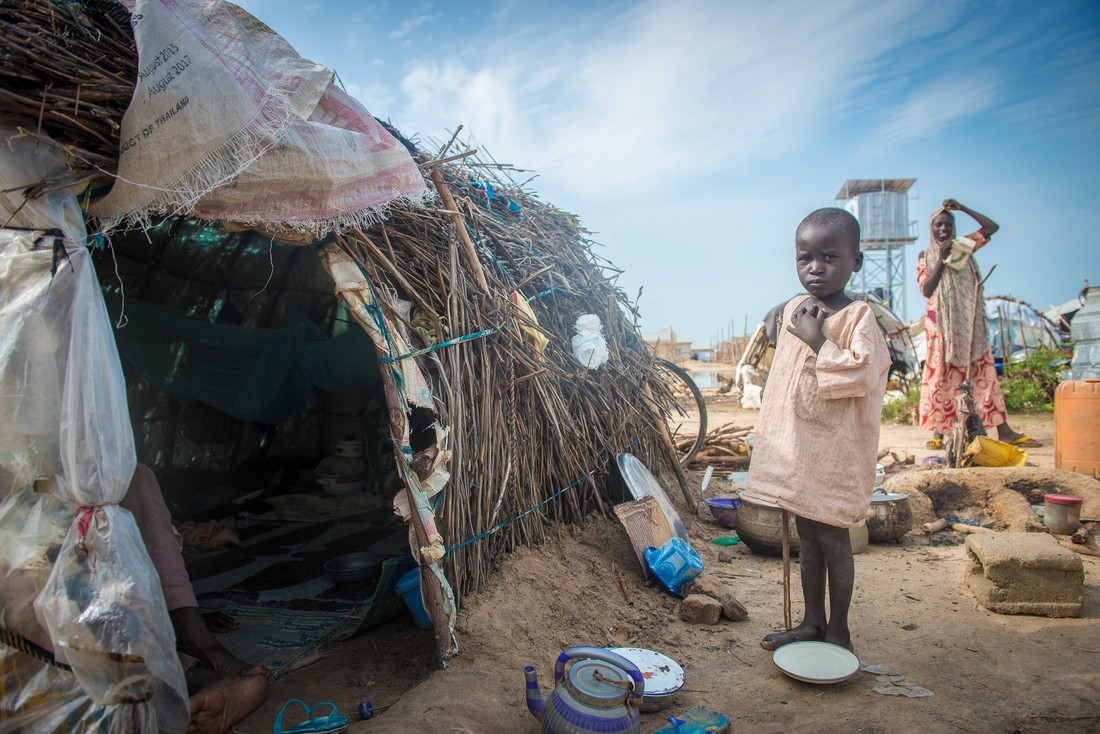Humanitarian, Africa03 OCT 2016
暴力的受害者 - 讓世人知道西非的危機 | Victims of violence – Shining a light on West Africa’s unknown crisis

Oxfam Hong Kong
Oxfam is a global organisation committed to creating a world without poverty through its advocacy, development and humanitarian work.

Photo: Ibrahim Dung/Oxfam
雖然世界正慢慢意識到正在西非州漫延的人道危機,但生活在危機下的西非人,他們遇到的可佈經歷,又有多少世人知道。
在尼日利亞的東北地區,以及在其鄰國尼日爾,乍得和喀麥隆發生的暴力衝突,已經迫使270萬人逃離家園,超過900萬人因此需要緊急援助。衝突又令當地人無法種植或購買農作物,數以百萬人因而要挨餓,估計已有數以萬人在衝突中餓死。
我第一次訪問位於尼日利亞東北地區阿達馬瓦州的Michika時,情境令人傷感難忘。來自博科聖地(Boko Haram)的襲擊,以及政府軍的還擊,嚴重打擊Michika居民的生活。但每當衝突停止,熱情好客又勤勞的當地人,就會奮力恢復正常生活。
在阿達馬瓦州州府Yola 外圍的大部分道路已經損壞。州內多個城鎮的銀行、學校、水電供應等基本服務亦被徹底破壞。在Michika,沒有一間銀行能正常運作。人民日常生活的設施被毁,是衝突地區常見的情況。
因發生在阿達馬瓦州內和南部博爾諾州部份地區的戰事,很多人離開家園逃至Michika。在博科聖地於2014年9月佔據Michika前,樂施會為逃至Michika的人提供人道救援物資。可是,當Michika失守後,他們又要再次被迫逃亡。
樂施會一直在Michika展開人道救援工作,以確保當地人有清潔飲用水,亦為被迫逃亡至Michika的居民,為逃亡者提供庇護的社區以及重返Michika的人,提供食物和衛生用品。我在今次行程中認識了Filomena,樂施會較早前修復了一個水井,這位七歲的小女孩就從這水井取水。她碰見我時,被我手上的攝影機嚇壞了。
我後來見到她的父母,終於明白為何這小女孩對我的攝影機如此害怕。Filomena的母親說:「Michika遇到的襲擊非常可佈,我希望永遠不會再碰到。在槍林彈雨下,我帶著七個孩子,花了一整天攀過Himmakai山。我的女兒Filomena目睹槍戰,所以當她看到你的攝影機,誤以為它是槍時,會表現得異常害怕。」
當Filomena母親從山上下來為家人尋找食物時,又碰到Michika被襲。她唯有逃到附近的一個小鎮,亦迫使她與孩子要短暫分開,要過一段時間才能回到孩子身邊。
這場嚴重的武裝衝突,不但影響Michika,更破壞尼日利亞全國及鄰近國家的安寧。為了可以更快地幫助更多受影響的人,協助更多如Filomena的孩子及她們的家庭,樂施會和其他援助機構都需要更多的設備,資源和人手。希望你也會支持我們的工作,讓有需要的人得到幫助。
(Original text)
The world is slowly waking up to the desperate crisis growing in West Africa, yet not much is known about the terrible experiences faced by the people affected.
The violence in north-east Nigeria, as well as in neighbouring Niger, Chad and Cameroon, has forced 2.7 million people to flee their homes and left over nine million people in need of emergency support. Unable to grow or buy food, millions are going hungry and thousands of people are estimated to have died already.
On my first visit to Michika, in north east Nigeria’s Adamawa state – an area badly hit by the conflict with Boko Haram and the military operations to counter them – it was heartbreaking to see its hospitable, industrious people struggling to get back on their feet once the fighting had stopped.
The first major mark of destruction we see approaching Michika was a demolished bridge, which the community has now filled with sand to allow people to travel in and out of the area.
“We couldn’t wait for the government to reconstruct this bridge. We had to do it ourselves. We’re used to bad roads and sand-filling the bridge isn’t harmful as long as vehicles can pass over it”, said a commuter we met on the bridge.
Most roads outside the state capital, Yola, have been damaged. In the towns, key services like banks, schools, water and electricity have been destroyed – this is a common sight in places following the fighting. Michika has no functioning banks.
Before Boko Haram captured the town in September 2014, Oxfam was providing humanitarian aid to people forced to flee the fighting from within Adamawa and some parts of southern Borno state. These people fled again after Michika came under attack.
Oxfam has been working hard in Michika to make sure people have clean drinking water, as well as providing food and hygiene items to people forced to flee, the communities sheltering them and those returning to their homes. During my trip, I met Filomena, a seven year old girl who was fetching water from one of the boreholes restored by Oxfam. She was terrified of the camera in my hand, and wishing to know more, I decided to meet her parents and find out why Filomena felt this way.
“The attack on Michika was an awful event, which I hope never to experience again. It took me the whole day to climb Himmakai Mountain with my seven children during the armed attacks. It usually only takes four hours to climb this mountain, but it took much longer because I had all my children with me. Some of them were still very little. My daughter witnessed gunshots and that is why she was scared of the camera”, Filomena’s mother explained.
When Filomena’s mother came down the mountain to fetch food for her family, the town was attacked again. She escaped to a nearby town – separated from her children until she could return.
Before Oxfam began work in the area, a nearby river was the family’s primary source of water. “My children were passing out blood in their urine and suffered from skin diseases. I still have a son with the skin disease”, she said.
Filomena and her mother are thankful that the new tap is helping to improve their quality of life and stop them getting ill.
Michika is just one of the areas hit hard by the ongoing violence in Nigeria and surrounding countries. If Oxfam is to help more children and families like Filomena’s, aid agencies need more equipment, more staff and more resources to help more people, faster.
